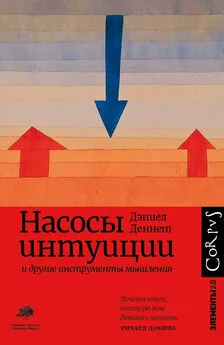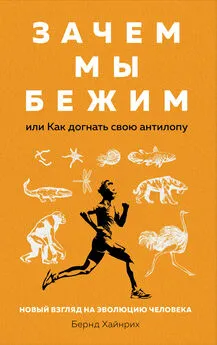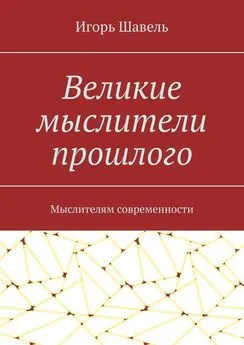Дэниел Клемент Деннет - Разум: от начала до конца. Новый взгляд на эволюцию сознания от ведущего мыслителя современности
- Название:Разум: от начала до конца. Новый взгляд на эволюцию сознания от ведущего мыслителя современности
- Автор:
- Жанр:
- Издательство:Литагент 5 редакция «БОМБОРА» (БЕЗ ПОДПИСКИ)
- Год:2021
- Город:М.
- ISBN:978-5-04-157344-7
- Рейтинг:
- Избранное:Добавить в избранное
-
Отзывы:
-
Ваша оценка:
Дэниел Клемент Деннет - Разум: от начала до конца. Новый взгляд на эволюцию сознания от ведущего мыслителя современности краткое содержание
В своей новой книге «Разум: от начала до конца» выдающийся философ Дэниел К. Деннет, опираясь на открытия современной науки, шаг за шагом исследует возникновение и развитие разума. Мировой бестселлер, получивший мировое признание, будет особенно интересен новому поколению философов и ученых.
Разум: от начала до конца. Новый взгляд на эволюцию сознания от ведущего мыслителя современности - читать онлайн бесплатно ознакомительный отрывок
Интервал:
Закладка:
–—. 2015b. “The Friar’s Fringe of Consciousness.” In Structures in the Mind: Essays on Language, Music, and Cognition in Honor of Ray Jackendoff, edited by Ida Toivonen, Piroska Csuri, and Emile van der Zee, 371–378. Cambridge, Mass.: MIT Press.
–—. 2015c. “Why and How Does Consciousness Seem the Way It Seems?” In Open MIND, edited by T. Metzinger and J. M. Windt. Frankfurt and Main: MIND Group. doi: 10.15502/9783958570245.
–—. 2015d. “How Our Belief in Qualia Evolved, and Why We Care So Much – A Reply to David H. Baßler.” In Open MIND, edited by T. Metzinger and J. M. Windt. Frankfurt: MIND Group. doi: 10.15502/9783958570665.
–—. Forthcoming. “Jonathan Bennett’s Rationality.” In Ten Neglected Classics, edited by Eric Schliesser.
Dennett, Daniel C., and Ryan T. McKay. 2006. “A Continuum of Mindfulness.” Behavioral and Brain Sciences 29: 353–354.
Descartes, René. (1637) 1956. Discourse on Method. New York: Liberal Arts Press.
–—. 1641. Meditations on First Philosophy. Paris: Michel Soly.
Diamond, Jared. 1978. “The Tasmanians: The Longest Isolation, the Simplest Technology.” Nature 273: 185–186.
Diesendruck, Gil, and Lori Markson. 2001. “Children’s Avoidance of Lexical Overlap: A Pragmatic Account.” Developmental Psychology 37 (5): 630–641.
Domingos, Pedro. 2015. The Master Algorithm: How the Quest for the Ultimate Learning Machine Will Remake Our World. New York: Basic Books.
Drescher, Gary L. 1991. Made-up Minds: A Constructivist Approach to Artificial Intelligence. Cambridge, Mass.: MIT Press.
Dyson, Freeman J. 1988. Infinite in All Directions: Gifford Lectures Given at Aberdeen, Scotland, April – November 1985. New York: Harper and Row.
Edelman, Gerald M. 1989. The Remembered Present: A Biological Theory of Consciousness. New York: Basic Books.
Eigen, Manfred. 1992. Steps Towards Life. Oxford: Oxford University Press.
Eldredge, Niles. 1983. “A la recherche du docteur Pangloss.” Behavioral and Brain Sciences 6 (3): 361–362.
Eliasmith, Chris. 2013. How to Build a Brain: A Neural Architecture for Biological Cognition. New York: Oxford University Press.
Emery, N. J. 2000. “The Eyes Have It: The Neuroethology, Function and Evolution of Social Gaze.” Neuroscience & Biobehavioral Reviews 24: 581–604.
Everett, Daniel L. 2004. “Coherent Fieldwork.” In Linguistics Today, edited by Piet van Sterkenberg, 141–162. Amsterdam: John Benjamins.
Fisher, D. 1975. “Swimming and Burrowing in Limulus anti Mesolimulus.” Fossils and Strata 4: 281–290.
Fitch, W. Tecumseh. 2008. “Nano-Intentionality: A Defense of Intrinsic Intentionality.” Biology & Philosophy 23 (2): 157–177.
–—. 2010. The Evolution of Language. Cambridge: Cambridge University Press. http://dx.doi.org/10.1017/CBO9780511817779.
Fitch, W. T., L. Huber, and T. Bugnyar. 2010. “Social Cognition and the Evolution of Language: Constructing Cognitive Phylogenies.” Neuron 65 (6): 795–814.
FitzGibbon, C. D., and J. H. Fanshawe. 1988. “Stotting in Thomson’s Gazelles: An Honest Signal of Condition.” Behavioral Ecology and Sociobiology 23 (2): 69–74.
Floridi, Luciano. 2010. Information: A Very Short Introduction. Oxford: Oxford University Press.
Fodor, Jerry, 1998. “Review of Steven Pinker’s How the Mind Works, and Henry Plotkin’s Evolution in Mind.” London Review of Books. Reprinted in Fodor, In Critical Condition. Cambridge, Mass.: Bradford Book/MIT Press.
–—. 2008. LOT 2: The Language of Thought Revisited. Oxford: Clarendon Press.
Francis, Richard C. 2004. Why Men Won’t Ask for Directions: The Seductions of Sociobiology. Princeton, N.J.: Princeton University Press.
Frischen, Alexandra, Andrew P. Bayliss, and Steven P. Tipper. 2007. “Gaze cueing of Attention: Visual Attention, Social Cognition, and Individual Differences.” Psychological Bulletin 133(4): 694–724.
Friston, Karl, Michael Levin, Biswa Sengupta, and Giovanni Pezzulo. 2015. “Knowing One’s Place: A Free-Energy Approach to Pattern Regulation.” Journal of the Royal Society Interface, 12: 20141383.
Frith, Chris D. 2012. “The Role of Metacognition in Human Social Interactions.” Philosophical Transactions of the Royal Society B: Biological Sciences 367 (1599): 2213–2223.
Gelman, Andrew. 2008. “Objections to Bayesian Statistics.” Bayesian Anal. 3 (3): 445–449.
Gibson, James J. 1966. “The Problem of Temporal Order in Stimulation and Perception.” Journal of Psychology 62 (2): 141–149.
–—. 1979. The Ecological Approach to Visual Perception. Boston: Houghton Mifflin.
Godfrey-Smith, Peter. 2003. “Postscript on the Baldwin Effect and Niche Construction.” In Evolution and Learning: The Baldwin Effect Reconsidered, edited by Bruce H. Weber and David J. Depew, 210–223. Cambridge, Mass.: MIT Press.
–—. 2007. “Conditions for Evolution by Natural Selection.” Journal of Philosophy 104: 489–516.
–—. 2009. Darwinian Populations and Natural Selection. Oxford: Oxford University Press.
Gorniak, Peter, and Deb Roy. 2006. “Perceived Affordances as a Substrate for Linguistic Concepts.” MIT Media Lab. See also Gorniak’s MIT dissertation, “The Affordance-based Concept.”
Gould, Stephen Jay. 1989. Wonderful Life: The Burgess Shale and the Nature of History. New York: W. W. Norton.
–—. 1991. Bully for Brontosaurus: Reflections in Natural History. New York: W. W. Norton.
–—. 1997. “Darwinian Fundamentalism.” Part I of review of Darwin’s Dangerous Idea, New York Review of Books, June 12.
–—. 1997b. “Evolution: The Pleasures of Pluralism.” Part II of review of Darwin’s Dangerous Idea, June 26.
Gould, Stephen Jay, and Richard C. Lewontin. 1979. “The Spandrels of San Marco and the Panglossian Paradigm: A Critique of the Adaptationist Programme.” Proceedings of the Royal Society of London, the Evolution of Adaptation by Natural Selection (Sept. 21), Series B, Biological Sciences 205 (1161): 581–598.
Graziano, Michael S. A. 2013. Consciousness and the Social Brain. Oxford, New York: Oxford University Press.
Grice, H. Paul. 1957. “Meaning.” The Philosophical Review 66: 377–388.
–—. 1968. “Utterer’s Meaning, Sentence Meaning, and Word Meaning.” Foundations of Language, 4. Reprinted as ch. 6 in Grice 1989, 117–137.
–—. 1969. “Utterer’s Meaning and Intentions.” Philosophical Review, 78. Reprinted as ch. 5 in Grice 1989, 86–116.
–—. 1972. Intention and Uncertainty. London: Oxford University Press.
–—. 1989. Studies in the Way of Words. The 1967 William James Lectures at Harvard University. Cambridge, Mass.: Harvard University Press.
Griffin, Donald R., and Carolyn A. Ristau. 1991. “Aspects of the Cognitive Ethology of an Injury-Feigning Bird, the Piping Plover.” In Cognitive Ethology: The Minds of Other Animals: Essays In Honor of Donald R. Griffin. Hillsdale, N.J.: L. Erlbaum Associates.
Griffin, R., and Dennett, D. C. 2008. “What Does The Study of Autism Tell Us about the Craft of Folk Psychology?” In Social Cognition: Development, Neuroscience, and Autism, edited by T. Striano and V. Reid, 254–280. Malden, Mass.: Wiley-Blackwell.
Griffiths, Paul, 1995. “The Cronin Controversy.” Brit. J. Phil. Sci. 46: 122–138.
–—. 2008. “Molecular and Developmental Biology.” In The Blackwell Guide to the Philosophy of Science, edited by Peter Machamer and Michael Silverstein, 252–271. Oxford: Blackwell.
Guston, Philip. 2011. Philip Guston: Collected Writings, Lectures, and Conversations, edited by Clark Coolidge. Berkeley, Los Angeles, London: University of California Press.
Haig, David. 1997. “The Social Gene.” Behavioural Ecology: An Evolutionary Approach, edited by John R. Krebs and Nicholas Davies, 284–304. Oxford: Blackwell Science.
–—. 2008. “Conflicting Messages: Genomic Imprinting and Internal Communication.” In Sociobiology of Communication: An Interdisciplinary Perspective, edited by Patrizia D’Ettorre and David P. Hughes, 209–223. Oxford: Oxford University Press.
Halitschke, Rayko, Johan A. Stenberg, Danny Kessler, André Kessler, and Ian T. Baldwin. 2008. “Shared Signals—‘Alarm Calls’ from Plants Increase Apparency to Herbivores and Their Enemies in Nature.” Ecology Letters 11 (1): 24–34.
Hansell, M. H. 2000. Bird Nests and Construction Behaviour. Cambridge: Cambridge University Press.
–—. 2005. Animal Architecture. Oxford: Oxford University Press.
–—. 2007. Built by Animals. Oxford: Oxford University Press.
Hardy, Alister, 1960. “Was Man More Aquatic in the Past?” The New Scientist, 642–645.
Hardy, Thomas. 1960. Selected Poems of Thomas Hardy. London: Macmillan.
Harris, Sam. 2012. Free Will. New York: Free Press.
Harvey, I., P. Husbands, D. Cliff, A. Thompson, and N. Jakobi. 1997. “Evolutionary Robotics: the Sussex Approach.” Robotics and Autonomous Systems 20 (2–4): 205–224.
Haugeland, John. 1985. Artificial Intelligence: The Very Idea. Cambridge, Mass.: MIT Press.
–—. 1998. Having Thought: Essays in the Metaphysics of Mind. Cambridge, Mass.:
Harvard University Press.
Hauser, Marc D. 1996. The Evolution of Communication. Cambridge, Mass.: MIT Press.
Hauser, Marc D., Noam Chomsky, and W. Tecumseh Fitch. 2002. “The Faculty of Language: What Is It, Who Has It, and How Did It Evolve?” Science 298 (5598): 1569–1579.
Heeks, R. J. 2011. “Discovery Writing and the So-called Forster Quote.” April 13. https://rjheeks.wordpress.com/2011/04/13/discovery-writing-and-the-so-called-forster-quote/
Henrich J. 2004. “Demography and Cultural Evolution: Why Adaptive Cultural Processes Produced Maladaptive Losses in Tasmania.” American Antiquity 69 (2): 197–221.
–—. 2015. The Secret of Our Success. Princeton, N.J.: Princeton University Press.
Hewes, Gordon Winant. 1973. The Origin of Man. Minneapolis: Burgess.
Hinton, Geoffrey E. 2007. “Learning Multiple Layers of Representation.” Trends in Cognitive Sciences 11 (10): 428–434.
Hofstadter, Douglas. 1979. Gödel, Escher, Bach: An Eternal Golden Braid. New York: Basic Books.
–—. 1981. “Reflections.” In The Mind’s I, edited by Hofstadter and Dennett. 403–404.
–—. 1982. “Can Creativity Be Mechanized?” Scientific American 247: 20–29.
–—. 1982b. “Who Shoves Whom Around Inside the Careenium? Or What Is the Meaning of the Word ‘I’?” Synthese 53 (2): 189–218.
–—. 1985. Metamagical Themas: Questing for the Essence of Mind and Pattern. New York: Basic Books.
–—. 2007. I Am a Strange Loop. New York: Basic Books.
Hofstadter Douglas, and Daniel Dennett, eds. 1981. The Mind’s I: Fantasies and Reflections on Self and Soul. New York: Basic Books and Hassocks, Sussex: Harvester.
Hohwy, Jakob. 2012. “Attention and Conscious Perception in the Hypothesis Testing Brain.” Frontiers in Psychology 3 (96): 1–14.
–—. 2013. The Predictive Mind. New York: Oxford University Press.
Huebner, Bryce, and Daniel Dennett. 2009. “Banishing ‘I’ and ‘We’ from Accounts of Metacognition.” Response to Peter Carruthers 2008. “How We Know Our Own Minds: The Relationship Between Mindreading and Metacognition.” Behavioral and Brain Sciences 32: 121–182.
Hughlings Jackson, J. 1915. “Hughlings Jackson on Aphasia and Kindred Affections of Speech.” Brain 38: 1–190.
Hume, David. 1739. A Treatise of Human Nature. London: John Noon.
Humphrey, Nicholas K. 1976. “The Social Function of Intellect.” Growing Points in Ethology: 303–317.
Читать дальшеИнтервал:
Закладка:
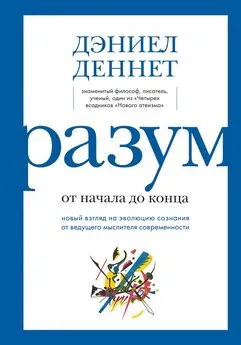

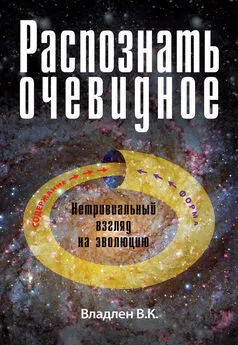


![Берндт Хайнрих - Зачем мы бежим, или Как догнать свою антилопу [Новый взгляд на эволюцию человека] [litres]](/books/1057566/berndt-hajnrih-zachem-my-bezhim-ili-kak-dognat-svo.webp)
![Джеффри Миллер - Соблазняющий разум [Как выбор сексуального партнера повлиял на эволюцию человеческой природы] [litres]](/books/1070954/dzheffri-miller-soblaznyayuchij-razum-kak-vybor-seksu.webp)

